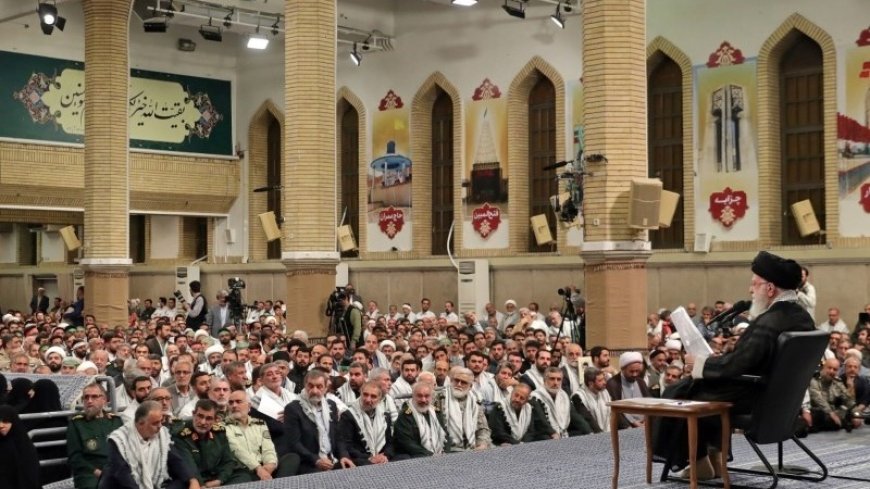Ayatollah Khamenei Draws Parallels Between Iran-Iraq War and the Current Gaza Conflict
In the meeting, the Supreme Leader of the Islamic Revolution gave a detailed analysis comparing the 8-year forced war of Iraq against the Islamic Republic of Iran and the mass killing war currently being conducted by the Zionist regime against the Gaza Strip

Veteran of the Iran-Iraq War as well as jihadist and muqawama (resistance) activists met with Ayatollah Khamenei, the Supreme Leader of the Islamic Revolution, in Tehran's Husseiniyyah of Imam Khomeini on Wednesday The event occurred on the fifth day of Iran's Holy Self-Defense Week, honoring the nation's defense during the 1980–1988 conflict driven on by Iraq. Leading by Hamas, Ayatollah Khamenei offered a thorough study in his speech comparing the eight-year war with Iraq with the continuous struggle between Israel and Gaza, highlighting parallels in their roots, international dynamics, and more general consequences for the Muslim world.
Starting with the geopolitical background of the Iran-Iraq war—which he said was sparked by world powers under danger from the Islamic Revolution— Ayatollah Khamenei started his address. At the time, he said, the United States, the Soviet Union, and its supporters considered the Islamic Revolution's philosophy—which sprang from opposition to imperialism and oppression—to be abhorrent. The revolution questioned the global power systems separating the globe into oppressors and the downtrodden. According to Khamenei, these forces aimed to quell the revolution by pushing Saddam Hussein, the leader of Iraq, to invade Iran, thereby leveraging his violent character and hunger for power.
Comparatively to the struggle of today, Ayatollah Khamenei pointed out that a similar coalition of Western countries is currently supporting Israel in its assault on Gaza. Supporting Israel's military operations as part of a larger strategy to stifle movements like Hamas and Hezbollah, which they see as challenges to Western hegemony in the region, he underlined that the United States and several European countries are not ready to accept any regional power that could challenge their interests in West Asia.
Ayatollah Khamenei's analogy focused mostly on the part Western countries play in helping Iraq during the Iran-Iraq conflict and their present assistance of Israel. Just as it today supports Israel's military operations in Gaza, he pointed out that under several administrations the United States gave Iraq information, weapons, and financial help during the eight-year fight.
He also denounced the United States for vetoing each UN Security Council resolution aiming at halting Israeli activity in Gaza, therefore undermining their validity. Khamenei says that despite public assertions of neutrality, this reveals the United States' obvious culpability in the continuous bloodshed as well as its extensive political and military engagement in the area.
Ayatollah Khamenei further underlined that the Muslim fighters in both wars are participating in what he defined as "jihad in the way of Ali." He commended Hezbollah's strong support of Gaza and its leadership for sticking with the Palestinians in face of great adversity and sacrifices. Khamenei underlined that the acts of Hezbollah and Palestinian fighters reflect a more general spiritual and ideological struggle against what he regards as a system of world domination than only territorial defense.
The disparity of military force in both wars was another main topic in the Supreme Leader's study. Iraq had great military resources and enormous worldwide backing during the Iran-Iraq war, yet it was unable to overcome Iran. Likewise, Khamenei noted that Israel, supported by the most powerful nations in the world and armed with cutting-edge military technologies, has not been able to fulfill its stated goals in Gaza, including eradicating Hamas or liberating hostages.
Like Saddam's military supremacy did not result in triumph in the war against Iran, he said Israel's dependence on contemporary military weapons and worldwide propaganda is not a guarantee of victory. Unlike Iran's final survival in the face of Iraq's invasion, Khamenei underlined the strength of the faith-driven resistance movements in Gaza and Lebanon, saying that triumph will finally go to the mujahideen fighting for their cause.
In his last words, Ayatollah Khamenei said that Israel's ongoing aggression against the people of Gaza and Lebanon points more toward despair than toward strength. He said that Israel would not have to engage in so great devastation and human losses if it was sure it could crush the resistance organizations. Drawing connections between Iran's defense during the Iraq war and the continuous resistance in Gaza and Lebanon, he underlined that faith and resilience—as shown by Hezbollah and the Palestinians—will finally triumph over military force.
Ayatollah Khamenei aimed to underline by contrasting these two battles that, although Western-backed forces could have more military might, the strength of religion, justice, and resistance will finally define the result of both wars. The comparisons between the conflicts are supposed to support the notion that, from Iran's perspective, the present battle is a component of a more general fight against imperialism and tyranny beyond boundaries.













































